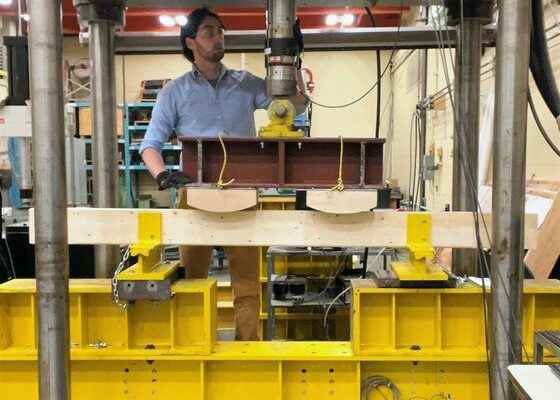A former Dutton man’s proposal of a campus building using timber has won him a top prize at an Italy-based engineering competition.
Tyler Hull, a PhD candidate in civil and environmental engineering at the University of Waterloo, won the student category of Build the Impossible in Cortaccia, Italy. The competition is organized by Rothoblaas, an Italian company which supplies items for mass timber construction internationally.
Working with about five other students, Hull submitted a proposal for a new engineering building at the University of Waterloo using mass timber. He presented the proposal to a panel of judges from the industry and academia.

“The winner of the professional category was actually the designers for what was until about a month ago the world’s tallest timber building,” he said. “There was some good company to be in.”
The Structural Timber and Applied Research Team, as the team is known, spent about three months last summer coming up with the design.
The 27-year-old said the award has started to open up more opportunities.
“There have been different people reaching out, from professionals in industry just to people wanting to know more about the project and wanting to know more about timber,” he said. “It obviously brings tremendous visibility to Waterloo engineering and specifically our research group doing timber (work).”
Hull’s research for his doctorate has focused on hollow core panels made of timber. He said since the use of the material is still in its infancy, he sees many possible applications.
“We’ve kind of seen a renaissance with the material with some of the new players … being able to make these large-scale products,” he said. “We can now make buildings that we typically thought we could only do with concrete or steel.”
Hesitancy to use a new technology and lack of awareness of the material have been barriers against timber becoming more widespread, Hull said.
However, he said they have tried to use this project to talk about the “lack of precedence” of timber-based campus buildings, noting there are only a few in Canada.
Hull said the University of Waterloo has discussed the idea with his team, but a new engineering building would be at least five to eight years away.

“We’re hoping to try and sell them maybe not on this exact design, but instead of just defaulting always to concrete, maybe we could do our next engineering building in timber,” he said.
Hull, who also completed his undergrad in civil engineering at the University of Windsor, plans to finish the research for his PhD in 2024.
Growing up in a small town like Dutton likely contributed to his interest in timber, he said, because “wood and farming were always linked together.”
